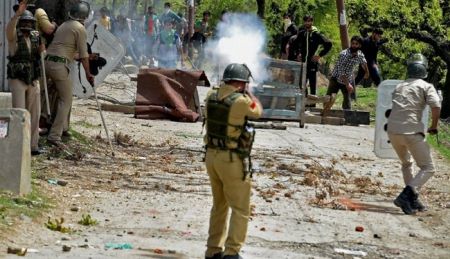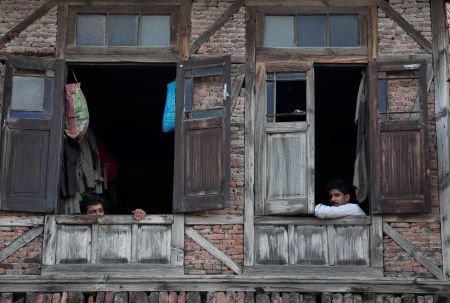The alliance between the National Conference (NC) and Congress in Jammu and Kashmir has played a pivotal role in shaping the region’s electoral landscape. Historically dominant political forces in the state, these two parties joined hands to successfully outmaneuver the Bharatiya Janata Party (BJP), which was eager to cement its presence in this highly sensitive region. This political victory sends a resounding message to Pakistan, which has long promoted terrorism in the Valley. Democracy, along with the unity of India’s diverse forces, triumphed in the face of both internal and external challenges.
However, the newly formed regime in Jammu and Kashmir (J&K) faces monumental tasks ahead. Navigating the post-Article 370 environment remains complex and fraught with challenges across political, security, and economic domains. These challenges demand strategic responses that will determine the region’s long-term stability.
Political Instability and Democratic Processes
The abrogation of Article 370 in August 2019, followed by the bifurcation of the state into two Union Territories—J&K and Ladakh—created a politically volatile scenario. Local parties such as the National Conference (NC), People’s Democratic Party (PDP), and Apni Party continue to express dissent over the loss of special status. The restoration of statehood and the holding of assembly elections are primary demands from these parties. Delays in elections have further exacerbated the political vacuum, alienating local populations. Rebuilding trust in the democratic process is one of the most critical challenges the new leadership faces.
Security Concerns and Militancy
 While there has been a marked reduction in terrorist activities in the Valley, militancy continues to simmer in pockets, threatening the region’s stability. Pakistan’s cross-border terrorism remains a constant concern, with sporadic incidents of violence targeting security personnel and non-local civilians. The new administration needs to enhance intelligence-gathering mechanisms, strengthen security coordination, and invest in de-radicalization programs, especially for disillusioned youth vulnerable to extremist ideologies. Long-term peace will only be achievable through comprehensive strategies addressing both immediate security concerns and the root causes of militancy.
While there has been a marked reduction in terrorist activities in the Valley, militancy continues to simmer in pockets, threatening the region’s stability. Pakistan’s cross-border terrorism remains a constant concern, with sporadic incidents of violence targeting security personnel and non-local civilians. The new administration needs to enhance intelligence-gathering mechanisms, strengthen security coordination, and invest in de-radicalization programs, especially for disillusioned youth vulnerable to extremist ideologies. Long-term peace will only be achievable through comprehensive strategies addressing both immediate security concerns and the root causes of militancy.
Economic Development and Unemployment
J&K’s economy, reliant on tourism, agriculture, and handicrafts, has been severely impacted by political unrest, security challenges, and the global COVID-19 pandemic. High unemployment rates, particularly among the youth, persist as pressing issues. To address this, the government must focus on attracting investment, fostering local industries, and revitalizing the tourism sector. The success of the new Industrial Policy (2021-30) and initiatives such as the Prime Minister’s Development Package (PMDP) will be essential for economic revival. Yet, private investors remain cautious, citing lingering security risks, making revitalizing the economy an uphill task.
Restoring Tourism and Promoting Investment
Jammu and Kashmir was once a coveted tourist destination, but political turmoil and security concerns have led to its decline. Rebuilding the tourism sector will be crucial for the region’s economic health. To achieve this, the government must work on restoring the confidence of both domestic and international tourists by ensuring safety and improving infrastructure. High-profile tourism campaigns and incentives for tourism-related businesses could spark a much-needed revival. Moreover, promoting eco-tourism, adventure tourism, and cultural tourism could diversify J&K’s appeal. However, without a stable security environment, any substantial private investment will remain out of reach.
Human Rights and Social Justice
The new administration must confront allegations of human rights violations that have fueled local discontent. Issues such as detentions under the Public Safety Act (PSA), internet restrictions, and constraints on freedom of expression have eroded trust between the government and the populace. Addressing these concerns through a transparent approach to justice and accountability is crucial for building a bridge between the administration and the public. Additionally, fostering inclusive dialogues among J&K’s diverse communities and safeguarding minority rights will promote social harmony and pave the way for long-term peace.
Rehabilitating Kashmiri Pandits
The rehabilitation of Kashmiri Pandits, who were displaced during the insurgency in the 1990s, remains a thorny issue. Despite multiple government initiatives, little progress has been made due to persistent security concerns and resistance from some local communities. Balancing the rehabilitation of this displaced community while maintaining social harmony is one of the most delicate challenges the government faces.
Dealing with External Influence
Pakistan’s continued interference in J&K through cross-border terrorism remains a significant external threat. The Line of Control (LoC) remains a hotspot for infiltration attempts and skirmishes. On the diplomatic front, Pakistan’s opposition to India’s sovereignty over J&K remains a thorn in bilateral relations. The new regime must skillfully manage these diplomatic pressures while asserting India’s stance on global platforms.
Addressing Regional Imbalances and the Ladakh Issue
The bifurcation of J&K into two Union Territories has raised concerns about regional imbalances. Ladakh’s demand for inclusion under the Sixth Schedule, which protects tribal rights, has yet to be addressed. The new leadership in J&K must work toward building positive relations with Ladakh’s leaders and ensuring fair resource distribution between the two regions.
Strengthening Grassroots Governance
The post-Article 370 era saw the introduction of Panchayati Raj Institutions (PRIs) and District Development Councils (DDCs), which were designed to decentralize governance. However, these institutions require proper empowerment, including adequate funds and decision-making authority. Strengthening grassroots governance will improve public participation and promote development, enhancing the credibility of democratic processes.
Education and Healthcare Reforms
 J&K’s education system faces numerous challenges, from infrastructure deficiencies to teacher shortages. Improving access to quality education is crucial, especially in conflict-ridden areas, to empower the youth. Similarly, the region’s healthcare infrastructure, exposed during the pandemic, needs urgent attention. Enhancing healthcare services, recruiting more professionals, and ensuring equitable access are vital for the region’s long-term social stability.
J&K’s education system faces numerous challenges, from infrastructure deficiencies to teacher shortages. Improving access to quality education is crucial, especially in conflict-ridden areas, to empower the youth. Similarly, the region’s healthcare infrastructure, exposed during the pandemic, needs urgent attention. Enhancing healthcare services, recruiting more professionals, and ensuring equitable access are vital for the region’s long-term social stability.
Environmental Concerns
J&K’s fragile ecology is another pressing issue. The retreat of glaciers, deforestation, and erratic climate patterns pose significant risks. Sustainable development initiatives, promoting afforestation, and conserving water resources are critical to preserving the region’s ecological balance.
Key Factors behind the NC-Congress Victory
Experts attribute several factors to the NC-Congress combine’s decisive mandate in J&K. Firstly, the NC, led by the Abdullah family, enjoys deep-rooted regional dominance in the Kashmir Valley. Its advocacy for Kashmir’s autonomy made it a natural choice for many voters. Additionally, the alliance presented itself as a secular alternative to the BJP, resonating with an electorate wary of the latter’s divisive policies.
Secondly, both parties have a legacy of governance in J&K, lending them credibility. The NC has long represented Kashmir’s political aspirations, while the Congress has been part of coalitions that governed during the Article 370 era. Their shared opposition to its abrogation allowed them to rally voters around restoring political autonomy, giving them an emotional and ideological platform.
Finally, the alliance’s strength in the Kashmir Valley and Congress’s presence in Jammu and Ladakh allowed them to effectively challenge the BJP across the Union Territory.
BJP’s Struggles in J&K
Despite its nationalist appeal, the BJP has struggled to gain a foothold in the Kashmir Valley, where its policies on Article 370 and perceived anti-Muslim rhetoric have alienated voters. The party’s developmental promises have not materialized to the satisfaction of many, further limiting its appeal. Additionally, the BJP lacks strong local leadership in the Valley, a region traditionally dominated by parties with deeper connections to local issues.
The NC-Congress alliance’s victory in Jammu and Kashmir, coupled with the challenges ahead for the new regime, reflects the region’s complex political landscape. While the alliance succeeded in outmanoeuvring the BJP, the path forward involves navigating a delicate balance of addressing local grievances, improving security, fostering economic development, and maintaining democratic processes. The success of this leadership will ultimately determine J&K’s trajectory toward lasting peace and development. ![]()
Disclaimer : PunjabTodayNews.com and other platforms of the Punjab Today group strive to include views and opinions from across the entire spectrum, but by no means do we agree with everything we publish. Our efforts and editorial choices consistently underscore our authors’ right to the freedom of speech. However, it should be clear to all readers that individual authors are responsible for the information, ideas or opinions in their articles, and very often, these do not reflect the views of PunjabTodayNews.com or other platforms of the group. Punjab Today does not assume any responsibility or liability for the views of authors whose work appears here.
Punjab Today believes in serious, engaging, narrative journalism at a time when mainstream media houses seem to have given up on long-form writing and news television has blurred or altogether erased the lines between news and slapstick entertainment. We at Punjab Today believe that readers such as yourself appreciate cerebral journalism, and would like you to hold us against the best international industry standards. Brickbats are welcome even more than bouquets, though an occasional pat on the back is always encouraging. Good journalism can be a lifeline in these uncertain times worldwide. You can support us in myriad ways. To begin with, by spreading word about us and forwarding this reportage. Stay engaged.
— Team PT

